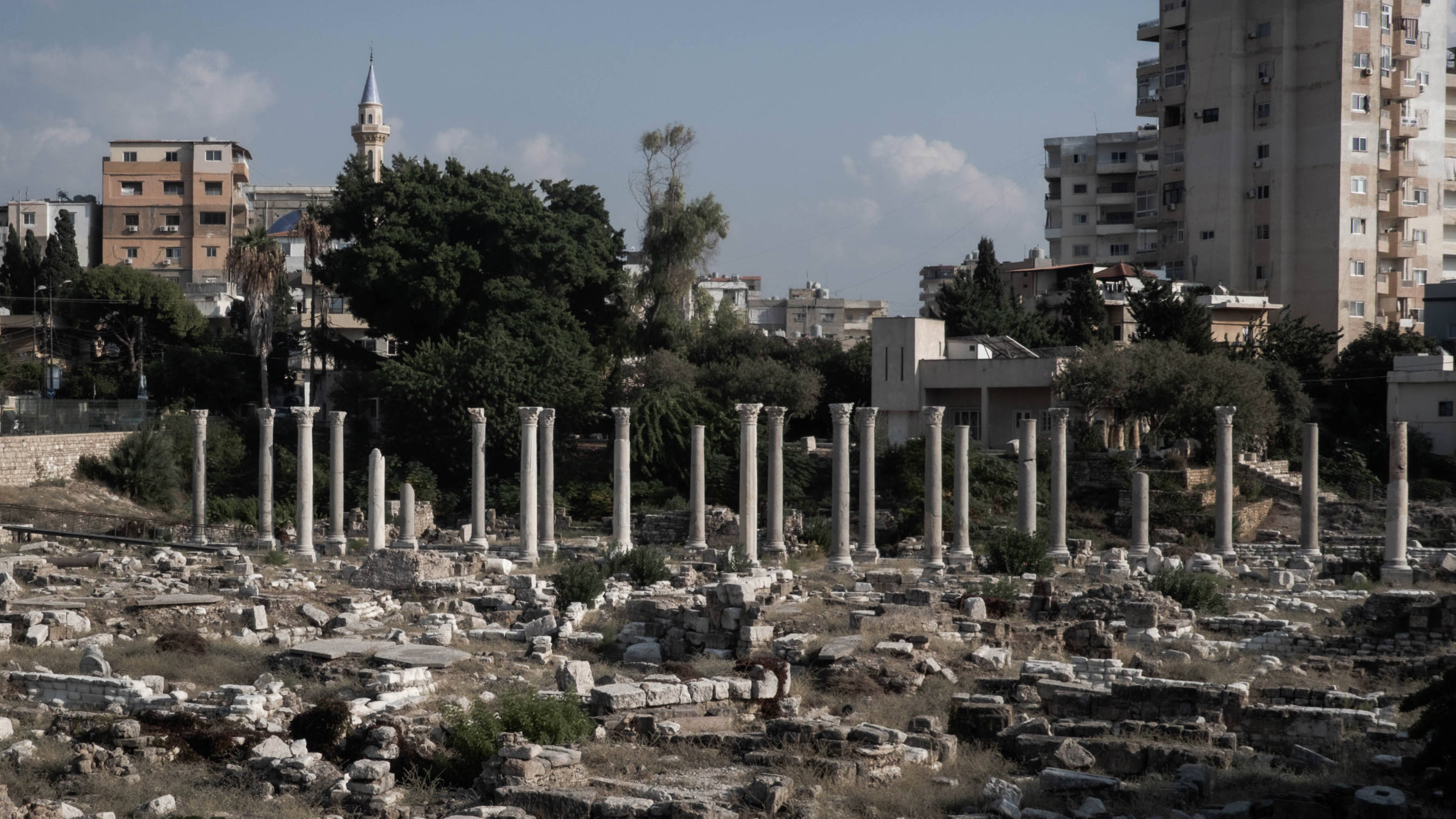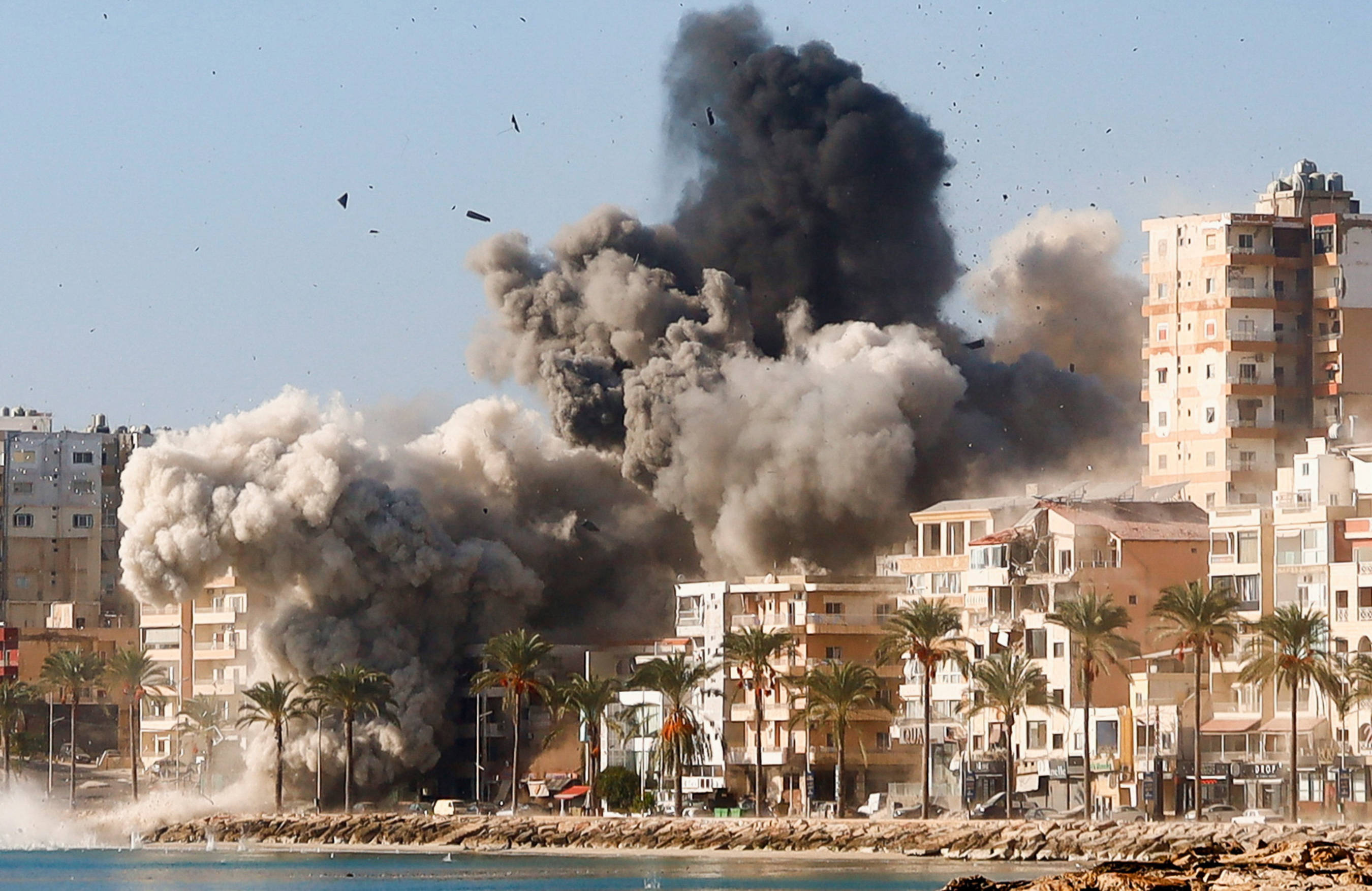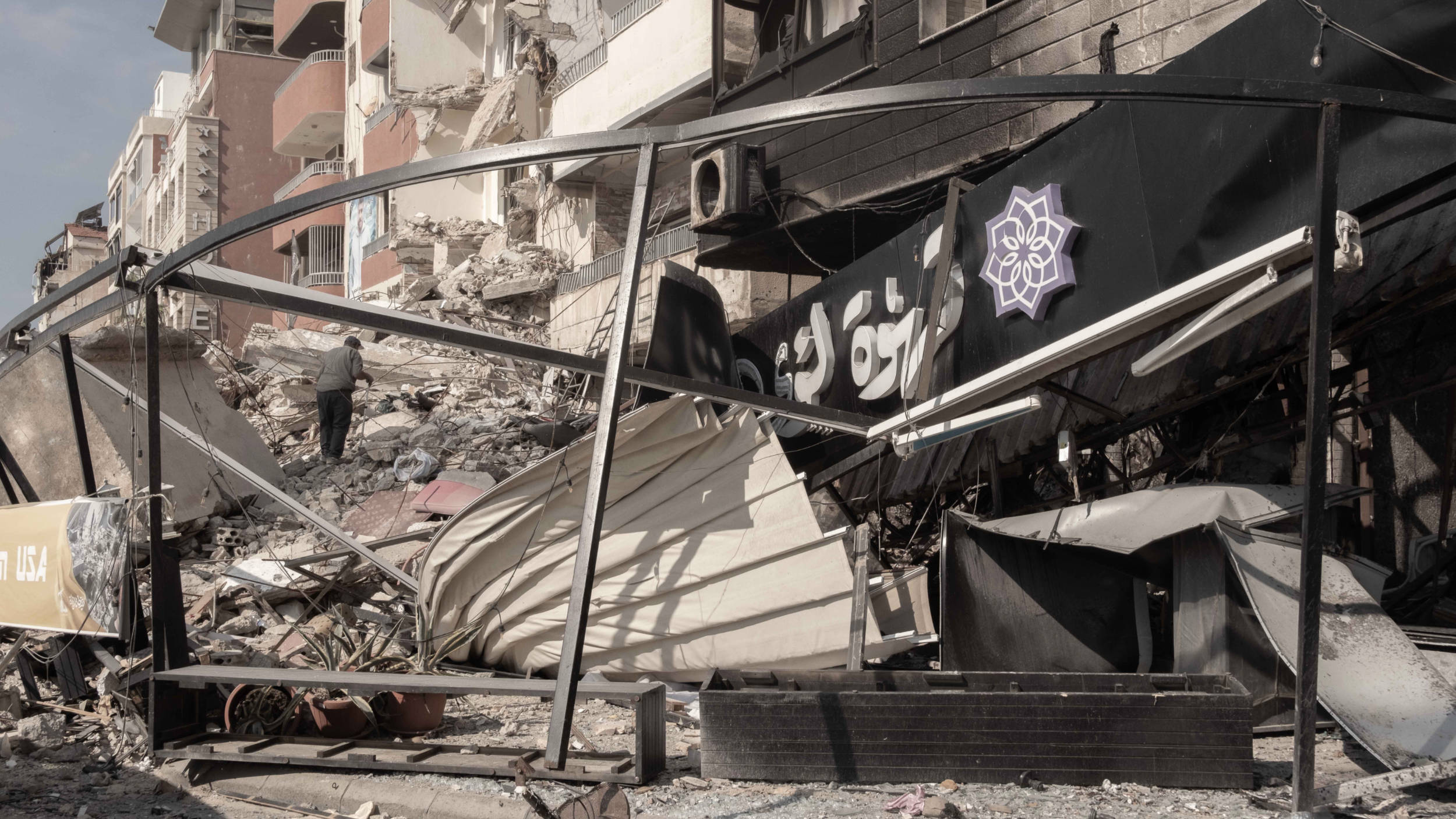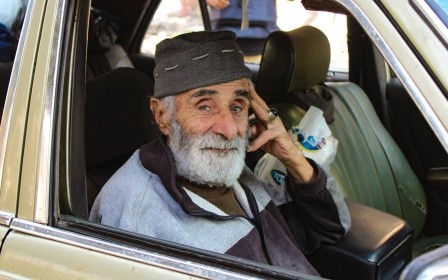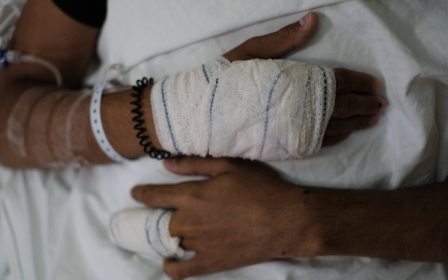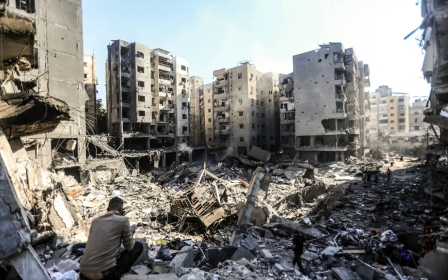Tyre: Defiant residents refuse to leave amid Israeli onslaught fearing city will be erased
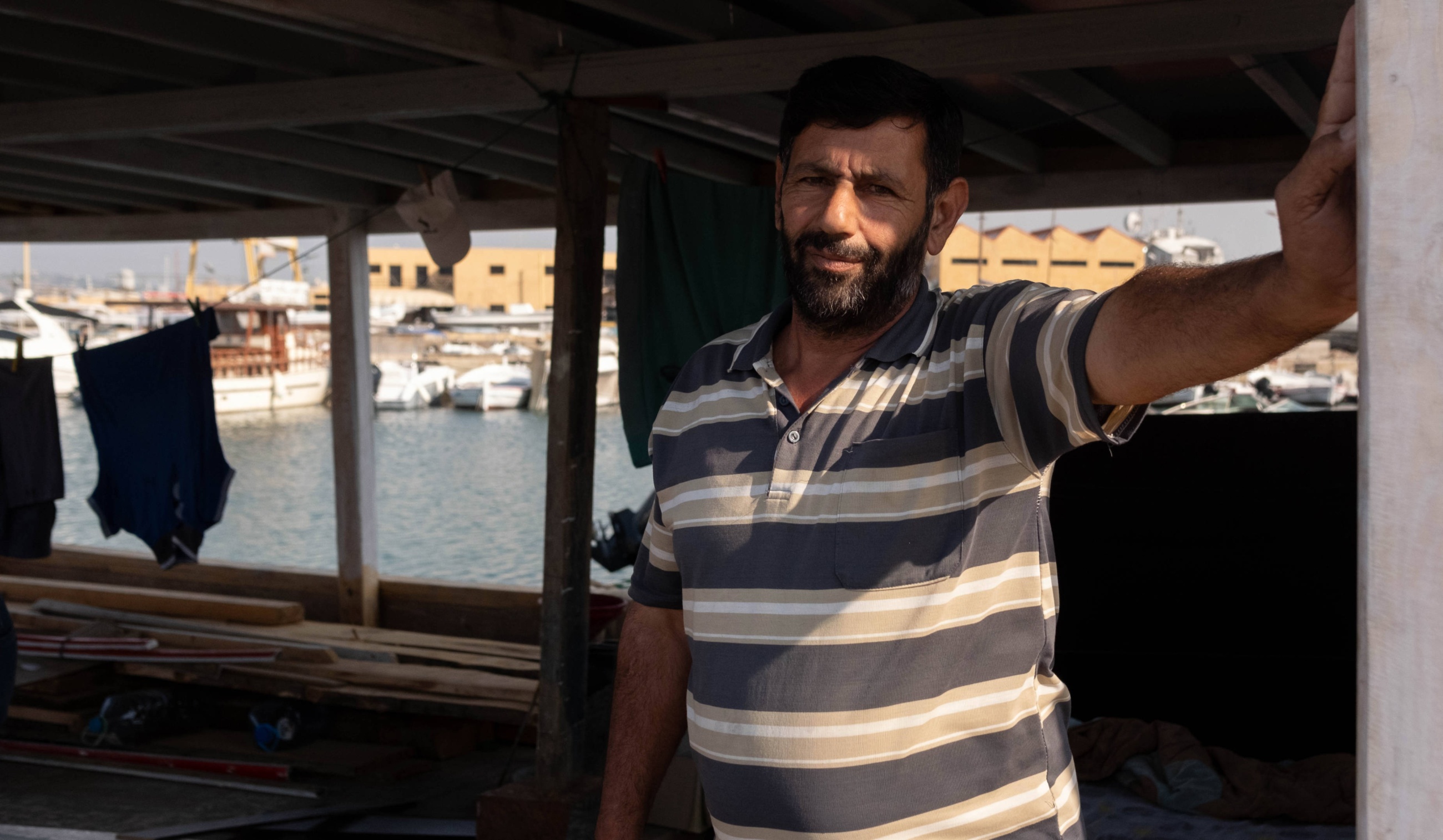
The coastal road that connects Beirut to Tyre, 80km south of the Lebanese capital, has an acrid stench of destruction.
For kilometres, the only vehicles visible on the once-busy highway are the carcasses of cars scattered along the roadside, grim remnants of the violence unleashed by Israeli strikes.
Tyre, the pearl of southern Lebanon, known as Sour in Arabic, is popular for its historical heritage, its architectural beauty and its beaches. Today, the ancient city seems cut off from the world.
"That's how it is, we can't do anything about it," 75-year-old Abou Elias told Middle East Eye.
Sitting on a chair in front of his home near the port, the elderly man refuses to leave his house despite the warnings of his relatives.
New MEE newsletter: Jerusalem Dispatch
Sign up to get the latest insights and analysis on Israel-Palestine, alongside Turkey Unpacked and other MEE newsletters
"I fear for the new generation more than for myself, my life is done," he said with a smile, undisturbed by the sound of a nearby bombing.
"It's like this day and night. From here, we can hear all the Israeli strikes on the nearest villages. Sometimes, it's our city that is hit."
Since 8 October 2023 and the opening of a front of support for Gaza by the Lebanese party Hezbollah, the area has been under constant tension. According to official figures from the health ministry, more than 3,580 people have been killed in Lebanon and over 15,200 wounded, the majority since the end of September.
Relatively spared until then, the city of Sour has been targeted by massive strikes since the end of October.
'Erase the memory'
Abou Elias has no doubt that this Israeli offensive is the most violent he has known in his life. According to him, this is the first time that this many residents have left the city.
"I am not in good health and I am one of the few people who owns a historic house downtown. Leaving it is out of the question. It is at least 200 years old. This is where I was born and this is perhaps where I will die," he said.
'My life is not very important, but if they destroy Sour, the Israelis will erase the memory'
- Abou Elias, Sour resident, 75
"I am like many people here. My life is not very important, but if they destroy Sour, the Israelis will erase the memory. And the history of our city is brilliant."
Continuously inhabited for 4,000 years, Sour is written in gold letters in the history of the Mediterranean basin. Its sailors, the Phoenicians, contributed to the construction of large cities across the sea, such as Carthage in Tunisia and Cadiz in Spain.
Sour has many ancient sites, mostly located in an area known as Al Mina (the harbour), and the city as a whole was added to the list of Unesco World Heritage Sites in 1984.
"Archaeological sites are usually far from cities and not very accessible to the population. In Tyre, however, they are part of the landscape, of the collective identity," Alia Fares, an archaeologist and heritage consultant for the American Society of Overseas Research (ASOR), told MEE. "That is why the residents are so concerned."
The Al Mina site, which houses remains from the Greek, Roman and Byzantine eras, is located within the city walls and is particularly vulnerable to bombardments nearby.
Abou Elias, a prominent Christian personality in the city, also accuses Israel of trying to sow discords between the different Lebanese religious communities who constitute an essential legacy of the city's history.
"All the religious communities have lived here together for so long," he said.
'The Israeli desire to sow discord between Shia Muslims and members of other faiths in order to lead the country to a new civil war is absurd'
- Ali, fisherman
A few metres away, by the port, a statue of the Virgin Mary watches over the boats. "Sometimes tourists ask us if we are in the Christian quarter. We tell them there is none, our neighbourhoods are mixed," continued Abou Elias.
For Ali*, a fisherman in his fifties, "the Israeli desire to sow discord between Shia Muslims and members of the other faiths in order to lead the country to a new civil war is absurd."
"They will not succeed," he said. "Sour is the best example of cohesion that can be, we do not even know the religion of our neighbours."
Hussein Kawar, a 46-year-old resident MEE met on the port, said he is afraid that the city will be razed. However, he stressed, its "stones are also built in our hearts".
"My whole family is from Sour. I experienced the Israeli occupation when I was younger. They arrested all the men in my neighbourhood and we were interrogated for hours in the city's resthouse," he told MEE, referring the nearly two decades when Israel occupied southern Lebanon from the early 1980s until 2000.
'I cried a lot'
Kawar does not plan to leave Sour either.
"It’s out of the question. I don’t want to see what happened to the Palestinians happen to me. They had to flee and lost their cities and homes forever," he told MEE, referring to the creation of Israel in 1948, during which 750,000 Palestinians were expelled, in an event known as the Nakba.
"Despite everything, I think the Lebanese resistance is very strong and that [the Israelis] won’t reach here," he said.
"Their only strength is the air force; they are unable to advance on land and it is to make us pay for this that they are destroying the whole country from the air."
Since the end of September, the Israeli ground offensive has been encountering fierce resistance from Hezbollah fighters. However, for the first time, the Israeli army announced earlier this week that it had installed an artillery battery on Lebanese territory, in the village of Shamaa, about 15 kilometres from Sour, according to local media.
At the port, Adel el-Abedi, a fisherman of Palestinian origin, has rearranged his boat so that he can live inside it during the war, in the hope that it will protect him from the strikes.
"We live day and night with the fear of [the Israeli army’s] 'evacuation orders' and strikes without warning," he told MEE.
"Obviously, the current episode is more violent and bloodier than the previous ones in our history, but it is a cyclical conflict that will only come back if it is not resolved. We are forced to resist; we have no choice."
For Abedi, the fear of seeing the descendants of the Israeli soldiers who expelled his father from Haifa in 1948 arrive in his city "is very strong".
"Sour symbolises many things for me, because this is where I was born. This is what makes this city different from others. Despite my Palestinian identity, everyone treats me like family," he told MEE.
"I cried a lot when the first bombings hit the city."
Made in USA
On the seafront, the scars of Israeli strikes are everywhere. In front of two destroyed buildings, Hezbollah supporters put up a "made in USA" banner. A few young people came to take selfies in front of it, before vanishing quickly.
In the sky, the drones buzzing at very low altitude and warplanes breaking the sound barrier were interpreted as a warning by locals, who swiftly emptied the streets.
In a poor district of the city, Rana*, 52, took MEE into the heart of a maze of alleys. Here, too, a strike had disfigured the landscape a few days ago. The houses had collapsed like a house of cards.
"An 80-year-old woman who lived a few metres away was killed. Only the families who cannot afford to leave the city have stayed," Rana said.
"We are being hunted. We never thought we would be attacked here. There are no military targets and the Israelis know it very well.
"We live outside our homes as much as possible, just in case, but many of us would rather die at home than like animals in the street."
Blood everywhere
Rukaya Halawi, aged 13, bears on her face the scars of the strike that defaced her neighbourhood. Timidly, she lifted her long hair to show the dozens of stitches scarring her scalp.
Standing near her parents, the young girl recounted how she was wounded and buried under the rubble for many long minutes before her brother pulled her out with his bare hands and took her to the hospital.
"I was on the stairs of my house when I heard the terrifying sound of the missile. The rest is blurred. I remember the screams of my mother who thought I had been killed, and the pain… I didn’t have the strength to speak or call them for help."
'I remember the screams of my mother who thought I had been killed, and the pain'
- Rukaya Halawi, 13
The family was unanimous in saying that there was no order to leave by the Israeli army before the attack.
"They have no mercy," her father said angrily.
The young girl continued: "The mother of my best friend and neighbour succumbed to her wounds after having both legs amputated. My friend was heartbroken to see her mother in that state, she was the one who evacuated her."
"I can’t describe how chaotic the scene was," Rukaya’s mother added.
"Everything was red, blood was everywhere. But we accept all the hardship that God imposes on us, everything becomes easy in the presence of the resistance," she said, referring to Hezbollah.
As fierce fighting continues between the group’s fighters and the Israeli army along Lebanon's southern borders, many fear that Sour could be the scene of an Israeli seaborne landing, especially since the amphibious operation carried out on 1 November in Batroun, a Christian seaside town located about 60 kilometres north of Beirut, that saw Israeli forces land from the sea.
In Sour, that same sea that has given everything to the city’s residents for centuries is now being observed with apprehension.
"The Israelis are capable of anything, they can reduce our city to a huge cemetery overnight, destroy our historical heritage… After all, none of this matters to them," said Ali, the fisherman.
* Names have been changed at the request of the interviewees.
Middle East Eye delivers independent and unrivalled coverage and analysis of the Middle East, North Africa and beyond. To learn more about republishing this content and the associated fees, please fill out this form. More about MEE can be found here.


